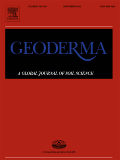
Geoderma
Scope & Guideline
Connecting Soil Science with Global Impact
Introduction
Aims and Scopes
- Soil Carbon Dynamics:
Research on the processes and factors affecting soil organic carbon storage, transformation, and emissions, particularly in relation to land use, management practices, and climate change. - Soil-Plant Interactions:
Investigations into how soil properties and management practices influence plant growth, nutrient uptake, and overall ecosystem health. - Soil Fertility and Nutrient Management:
Studies that explore the dynamics of essential soil nutrients, the impact of fertilizers, and strategies for sustainable nutrient management in agricultural systems. - Soil Physics and Hydrology:
Research focusing on the physical properties of soils, including moisture retention, permeability, and their implications for water management and erosion. - Soil Remediation and Contamination:
Papers addressing the impact of contaminants on soil health, and the effectiveness of various remediation techniques to restore soil functionality. - Digital Soil Mapping and Modeling:
Advancements in methodologies for soil mapping using remote sensing, machine learning, and geostatistical approaches to improve soil resource management. - Soil Microbial Ecology:
Research on the composition, function, and interactions of microbial communities in soils and their contributions to nutrient cycling and soil health. - Soil Conservation and Land Management:
Studies focused on the effects of different land management practices on soil conservation, erosion control, and overall soil health.
Trending and Emerging
- Machine Learning and AI in Soil Science:
The application of machine learning and artificial intelligence techniques for predicting soil properties and mapping has gained significant traction, allowing for more accurate and efficient assessments. - Soil Health and Ecosystem Services:
Increasing emphasis on the role of soil health in supporting ecosystem services, including carbon sequestration, nutrient cycling, and biodiversity, highlighting the need for sustainable land management practices. - Impact of Climate Change on Soil:
Research examining the effects of climate change on soil processes, including carbon dynamics, nutrient cycling, and overall soil health, is becoming increasingly prominent. - Soil Microbial Functions and Diversity:
A growing focus on understanding the roles of soil microbial communities, their diversity, and their interactions with soil organic matter and nutrient cycling. - Soil Restoration and Rehabilitation:
Research directed towards strategies for restoring degraded soils, including the use of organic amendments and innovative management practices to improve soil quality. - Soil-Plant-Microbe Interactions:
Emerging studies that explore the complex interactions between soil, plants, and microbial communities are gaining importance, particularly in the context of sustainable agricultural practices. - Remote Sensing and Precision Agriculture:
The use of remote sensing technologies for soil assessment and management practices in precision agriculture is trending, emphasizing the integration of technology in soil science.
Declining or Waning
- Traditional Soil Classification Systems:
Research centered around traditional soil classification methods is becoming less prominent as there is a move towards more dynamic and integrative approaches that consider soil functions and ecosystem services. - Single-Factor Soil Studies:
Studies that focus solely on a single soil factor (e.g., pH or texture) without considering the broader context of soil interactions and ecosystem functions are decreasing. - Historical Soil Studies:
Research that primarily focuses on historical soil data without integrating modern techniques or perspectives on soil management is waning in favor of studies that emphasize current issues and sustainable practices. - Laboratory-Only Studies:
Research that relies solely on laboratory conditions is declining as the field increasingly values field-based studies that reflect real-world complexities and interactions. - Studies on Soil Erosion without Management Implications:
Research that examines soil erosion without recommendations for management practices or mitigation strategies is becoming less common as practical applications are prioritized.
Similar Journals

EURASIAN SOIL SCIENCE
Innovating solutions for soil conservation and management.EURASIAN SOIL SCIENCE, published by PLEIADES PUBLISHING INC, is a premier journal dedicated to advancing knowledge in the fields of soil science and earth-surface processes. With an ISSN of 1064-2293 and an E-ISSN of 1556-195X, this journal has been a key resource for researchers and professionals from its inception in 1992 and continues to thrive as it converges toward 2024. Situated in the United States, EURASIAN SOIL SCIENCE has achieved notable recognition, attaining a Q2 ranking in both Earth-Surface Processes and Soil Science categories as of 2023. Its Scopus rankings further underscore its importance, with Earth and Planetary Sciences placing it at #81/179 and Agricultural and Biological Sciences ranking it at #80/159. Engaging a global audience, this journal publishes cutting-edge research articles, reviews, and case studies that address critical issues related to soil health, conservation, and management. Though currently not open access, the journal offers valuable insights and fosters collaboration among scientists and practitioners, underscoring its vital role in enhancing the understanding of soil dynamics and sustainability.
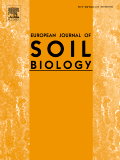
EUROPEAN JOURNAL OF SOIL BIOLOGY
Elevating Soil Science to New HeightsThe EUROPEAN JOURNAL OF SOIL BIOLOGY is a leading publication through ELSEVIER FRANCE-EDITIONS SCIENTIFIQUES MEDICALES ELSEVIER, renowned for its rigorous contribution to the fields of soil science, microbiology, and insect science. Established in 1993 and continuing to thrive until 2024, this journal is recognized for its high academic standards, achieving a prestigious Q1 ranking across multiple disciplines including Insect Science, Microbiology, and Soil Science in 2023. With a Scopus rank placing it in the top tiers of relevant categories, the journal serves as a vital platform for disseminating groundbreaking research and advancements in soil biology. Although currently not an open access journal, it offers valuable insights to researchers, professionals, and students, enhancing understanding and fostering innovative solutions for global soil health challenges. The journal's ISSN is 1164-5563 and its E-ISSN is 1778-3615, offering a wealth of knowledge from an esteemed publisher situated in France.
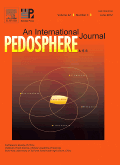
PEDOSPHERE
Exploring Soil Dynamics and Environmental InteractionsPEDOSPHERE, published by SCIENCE PRESS, is a leading journal in the field of Soil Science, holding a prestigious position in the Q1 category as per the latest evaluations, reflecting its high impact and relevance in the domain. Established in 1996, this journal is committed to advancing our understanding of soil-related processes and their interactions with various environmental components, providing a platform for innovative and high-quality research. With an impressive rank of #13 out of 159 in the Scopus classifications for Agricultural and Biological Sciences, PEDOSPHERE reaches the 92nd percentile, indicating its significance among scholarly publications. Although the journal operates under traditional access options, it remains an essential resource for researchers, professionals, and students keen on exploring the complexities of soil dynamics and sustainability. By bridging interdisciplinary methodologies and fostering collaboration, PEDOSPHERE plays a vital role in addressing global challenges related to soil management, conservation, and ecological balance.
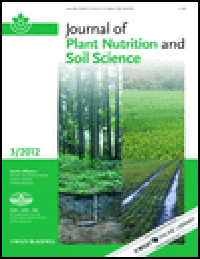
JOURNAL OF PLANT NUTRITION AND SOIL SCIENCE
Empowering researchers to cultivate excellence in agriculture.JOURNAL OF PLANT NUTRITION AND SOIL SCIENCE, published by WILEY-V C H VERLAG GMBH, stands as a premier platform in the field of agricultural and biological sciences, focusing specifically on the intricacies of plant nutrition and soil science. With an impressive impact factor and a respected Q1 category ranking in Plant Science and Q2 category ranking in Soil Science for 2023, this journal is essential for researchers and professionals seeking to advance their understanding and foster innovative practices in sustainable agriculture. The journal’s open access options ensure a broad dissemination of knowledge, appealing to a global audience and facilitating collaborative research efforts. Embracing a broad scope that extends from foundational science to cutting-edge research developments in soil health and nutrient management, the journal serves as a critical resource for both emerging scholars and established experts, reinforcing its pivotal role in addressing the challenges of food security and environmental sustainability. With years of convergence from 1996 to 2024, it remains committed to excellence in scholarly communication, providing a vital forum for the sharing of valuable insights and advancements in the field.
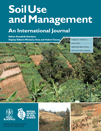
SOIL USE AND MANAGEMENT
Connecting research to practice in soil management.SOIL USE AND MANAGEMENT is a premier academic journal published by Wiley, focusing on the critical domains of Agronomy, Crop Science, Pollution, and Soil Science. With an ISSN of 0266-0032 and an E-ISSN of 1475-2743, the journal has established itself as a vital resource in the field since its inception in 1985. Operating from its U.S. headquarters in Hoboken, NJ, SOIL USE AND MANAGEMENT boasts impressive Q1 rankings across its relevant categories, indicating its standing in the top tier of research journals. Notably, it is ranked 48th out of 406 journals in Agronomy and Crop Science and holds an 88th percentile position, as well as a commendable rank of 26th out of 159 journals in Soil Science, underscoring its influence and reach. This journal serves as an essential platform for researchers, professionals, and students dedicated to sustainable soil management practices and understanding soil's role in agricultural productivity and environmental health. Although it does not offer Open Access, its rigorous peer-review process ensures the publication of high-quality original research, reviews, and case studies critical for advancing knowledge and practice in the field. This journal is crucial for anyone engaged in soil science and its related disciplines, encouraging innovative approaches to challenges facing soil use and management today.

EGYPTIAN JOURNAL OF SOIL SCIENCE
Advancing Soil Science for Sustainable FuturesEGYPTIAN JOURNAL OF SOIL SCIENCE is a renowned publication dedicated to advancing the field of soil science, particularly within the context of Egypt and the broader regions of the Middle East and North Africa. Published by the NATIONAL INFORMATION DOCUMENTATION CENTER, ACADEMIC SCIENTIFIC RESEARCH & TECHNOLOGY, this journal aims to disseminate high-quality research and innovative practices related to soil management, conservation, and sustainable agricultural practices. With an emphasis on empirical studies, reviews, and methodologies relevant to soil health and productivity, this journal serves as an essential resource for researchers, professionals, and students alike. Although specific access options are not highlighted, the journal’s commitment to promoting scholarly discourse ensures that important findings within soil science are made available to wider audiences, contributing significantly to environmental science, agronomy, and ecological preservation.
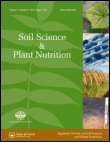
SOIL SCIENCE AND PLANT NUTRITION
Nurturing research for thriving ecosystems.SOIL SCIENCE AND PLANT NUTRITION, published by Taylor & Francis Ltd, stands as a prominent journal in the fields of plant science and soil science, with its impact reflected in its Q2 ranking across both categories in 2023. Established in 1955, this journal provides a vital platform for researchers, professionals, and students dedicated to understanding the complex interactions between soil and plant nutrition, with an emphasis on advancing sustainable agricultural practices. With an impressive Scopus ranking, placing it in the 75th percentile for Plant Science and the 71st for Soil Science, it attracts high-quality, peer-reviewed articles that contribute significantly to the body of knowledge in these disciplines. While the journal does not currently offer Open Access options, its comprehensive scope encompasses studies from fundamental research to applied science, making it an essential resource for anyone engaged in soil management, agronomy, or related fields.

Soil Systems
Transforming Soil Knowledge into Environmental SolutionsSoil Systems, published by MDPI, is a premier open access journal dedicated to advancing the understanding of soil science and earth-surface processes. Launched in 2017, this journal has quickly established itself with a strong presence in the academic community, holding a prestigious Q1 ranking in both Earth-Surface Processes and Soil Science as of 2023. With an impressive Scopus rank in the top 20% of its categories, Soil Systems is an essential platform for disseminating groundbreaking research addressing the challenges and complexities of soil management, its ecological significance, and its role in sustainable development. The journal operates under an open access model since 2018, ensuring maximum visibility and accessibility for researchers, professionals, and students alike. Based in Switzerland, at ST ALBAN-ANLAGE 66, CH-4052 BASEL, Soil Systems encourages contributions that promote interdisciplinary collaboration, innovative methodologies, and the application of findings to real-world issues related to soil health and environmental sustainability.

JOURNAL OF SOILS AND SEDIMENTS
Fostering Dialogue on Soil and Sediment SignificanceJOURNAL OF SOILS AND SEDIMENTS, published by SPRINGER HEIDELBERG, stands as a premier interdisciplinary platform dedicated to advancing the understanding of soil and sediment dynamics within the broader context of Earth sciences. With an impressive impact factor and a Q1 ranking in both Earth-Surface Processes and Stratigraphy, this journal not only reflects the high quality of research but also contributes significantly to the dialogue amongst researchers, professionals, and students in the field. The journal encompasses a wide spectrum of topics from sedimentology to soil science, making it essential reading for those involved in environmental management, agriculture, and geology. Access options are available to ensure that cutting-edge research is accessible to a global audience, reflecting the journal's commitment to fostering collaboration and innovation. As we converge towards 2024, JOURNAL OF SOILS AND SEDIMENTS aims to continue its role in shaping scientific inquiry and policy formulation concerning the vital roles of soils and sediments in ecological and geological systems.
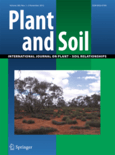
PLANT AND SOIL
Cultivating insights for sustainable agriculture and soil health.PLANT AND SOIL is a prestigious academic journal that has been at the forefront of plant and soil research since its inception in 1948. Published by SPRINGER in the Netherlands, this journal has carved a niche as a leading source of high-quality, peer-reviewed articles, which are essential for researchers, professionals, and students in the fields of Plant Science and Soil Science. With an impressive impact factor placing it in the Q1 category of both disciplines, it ranks 50th in the field of Plant Science and 24th in Soil Science, highlighting its influence in the scientific community. Although not available as open access, the journal provides a wealth of knowledge and insights into the interactions between plants and soils, exploring critical topics such as soil health, crop productivity, and sustainable agriculture practices. Researchers who wish to contribute to this vital area of study through their empirical findings will find PLANT AND SOIL to be an invaluable platform for disseminating their work and connecting with a network of leading scholars committed to advancing our understanding of these essential ecosystems.